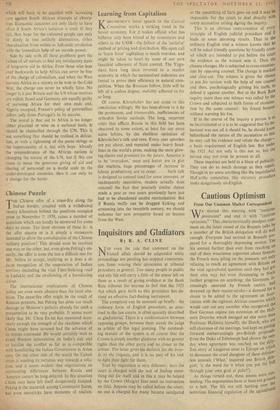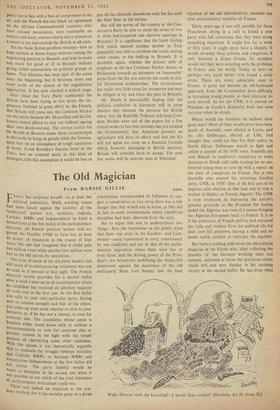Cautious Optimism
From Our 'Common Market Correspondent
E started this meeting with "cautious pessimism" and end it with "cautious optimism." ' This characteristically deadpan CO°1" ment on the latest round of the Brussels talks by a member of the British delegation will do well enough. Everyone had arrived in Brussels pre- pared for a thoroughly depressing session. The Six seemed further than ever from reaching an end of their wearisome argument about finance; the French were piling on the pressure, not 0111Y refusing to reach an agreement with Britain 00 the vital agricultural question until they had got their own way but even threatening to block further progress on anything; the Germans, hi- creasingly annoyed by French tactics, had dreamed up their master-stroke—a demand for a clause to be added to the agreement on Asso- ciation with the eighteen African countries which would cast out any member who recognised the East German regime (an extension of the Nall- stein Doctrine which enraged no one more than Professor Hallstein himself); the Dutch, who are still chairmen of the meetings, had kept on putting forward embarrassingly pro-British proposals. Even the Duke of Edinburgh had chosen the verY day when agreement was reached on the difty: free entry of kangaroo meat to Europe on which to denounce the cruel slaughter of these defeOce- less animals (*What,' inquired one British defer, gate, 'is the word for it when you put the hall through your own goal at polo?'). As things turned out, these omens were mis- leading. The negotiations have at least not groun to a halt, The Six are still battling over the notorious financial regulation of the agricultural
Polley but at last with a hint of compromise in the air; and the French did not block an agreement On the African Commonwealth countries who have refused Association, were reasonable on mutton and lamb, and are clearly not at present in a mood to try and exclude the British at all costs.
Yet the basic British problem remains—how to keep opinion at home happy without ruining the negotiating position in Brussels, and how to make any move for good or ill in Brussels without giving lethal ammunition to political groups at home. This dilemma has been part of the scene since the beginning, but it becomes more and more acute as the climax of the negotiations approaches. It has now reached a critical stage.
Ever since the Tory Party conference the British have been trying to live down the im- pression, fostered to great effect by the French, that Britain will come into the Common Market on any terms because Mr. Macmillan and his fol- lowers cannot afford to stay out without signing their own death-warrant. The correct tactics for the British in Brussels under these circumstances is obviously to hang on grimly while the Govern- ment lays on an atmosphere of tough scepticism at. home. (Lord Boothby's famous letter to the TUTU'S was an amateur essay in this kind of strategem.) On this assumption it would be best to
put off the climactic showdown with the Six until the New Year at the earliest.
But will the nerves of the country or the Con- servative Party be able to stand the strain of two or three bad-tempered and abortive meetings in Brussels? It is significant that the latest Gallup Poll which showed another decline in Tory popularity was able to attribute the result, among other causes, to the hold-up in Brussels. It is doubtful, again, whether the distinct shift of emphasis in the last Common Market debate in Parliament towards an insistence on 'reasonable' terms from the Six was entirely the result of skil- ful Ministerial orchestration. The Government has really very little room for manoeuvre and may be obliged to try and force the pace in Brussels.
Mr. Heath is presumably hoping that the political confusion in Germany will in some obscure way increase the pressure for British entry; that the Radcliffe Tribunal will keep Com- mon Market news out of the papers for a few crucial weeks (a fact that certainly has not escaped the Government); that American pressure on agriculture will have its effect; and that the Six will not agree too soon on a financial formula which, however damaging to British interests, Britain will certainly have to accept. The next few weeks will be anxious ones in Whitehall.











































































 Previous page
Previous page